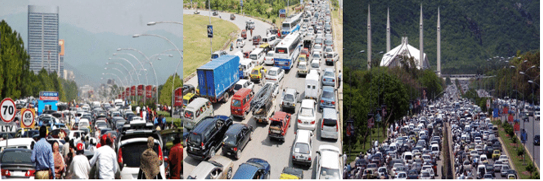i INP-WEALTHPK
Ayesha Saba
Pakistan’s urban transport sector faces significant challenges of congestion and inadequate infrastructure, and the country can learn from China, which has developed advanced, sustainable transportation

systems, for efficient urban mobility solutions.
“Pakistan’s urban transport infrastructure is unable to meet the demands of a rapidly growing population. The absence of an integrated public transportation system, outdated infrastructure and lack of coordination between transport authorities exacerbate the situation,” points out Dr Hassan Dawood Butt, former project director of CPEC, and senior adviser at the Sustainable Development Policy Institute (SDPI). Talking to WealthPK, he said the solution lied in overhauling the entire system by drawing lessons from countries such as China that have successfully modernised their urban transport sectors. He further said that China had successfully modernised its urban transportation over the past few decades, particularly in cities like Beijing and Shanghai, and became a pioneer in green transportation innovation, as well as a top manufacturer and operational expert in green public transit.
“China’s investment in infrastructure under CPEC offers Pakistan an opportunity to not only improve its transport systems but also leverage China’s expertise in urban transport planning,” he noted. “However, it’s essential to adapt the lessons suited to Pakistan’s unique context and to prioritise projects that align with the country’s specific needs and goals. Effective implementation and governance will be crucial to the success of Pakistan’s transportation initiatives.” Meanwhile, Muhammad Arif Goheer, Principal Scientific Office Coordinator, Global Change Impact Studies Centre (GCISC), Ministry of Climate Change, said that transport as a sector was the largest and fastest-growing emitter of greenhouse gases (GHG). “While the exact figure of the factor contribution of transport to total emissions is unavailable for Pakistan, transport globally accounts for 20-30% of GHG for developed countries,” he noted while talking to WealthPK.
“As Pakistan faces its worst smog in recent years, there is an urgent need for the transport sector to adopt proactive measures to mitigate and adapt to climate change effects. The deteriorating air quality, particularly in major cities like Lahore, has exacerbated the public health and environmental concerns,” he said. Goheer also pointed to successful examples of cities such as Singapore, Beijing, Jakarta, Bogota, Abu Dhabi and Cairo, which have demonstrated that it is possible to foster job creation, support economic development and enhance the quality of life for residents while significantly reducing their carbon footprint. He suggested that Pakistan could greatly benefit from integrated planning and more efficient use of resources, which would not only promote economic prosperity and social inclusion but would also reduce costs and contribute to sustainable urban development.
Credit: INP-WealthPk









